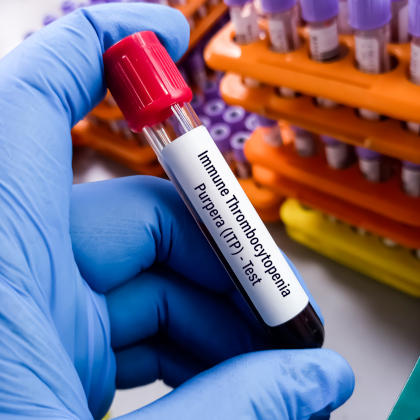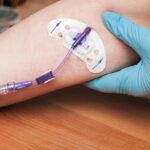
IVIG therapy is primarily used to treat immunodeficiencies, autoimmune diseases, inflammatory disorders, and certain infections. During this therapy, a solution containing antibodies derived from healthy donors is infused into a patient’s bloodstream.
Speak to a Specialist About Copay Assistance
The main objective of this therapy is to restore the compromised immune system to its optimal state by administering essential antibodies, which serve as a fundamental element of immunity. These antibodies play a critical role in combating infections, safeguarding against harmful pathogens, and maintaining immune responses at a balanced level.
In this article, we will delve into different conditions where IVIG is typically recommended as the primary treatment or as an additional (off-label) therapeutic choice.
Conditions That IVIG Can Treat
In 1981, a groundbreaking milestone occurred when the FDA granted its initial approval for IVIG therapy, encompassing six critical conditions. These included chronic B-cell lymphocytic leukemia, primary immune deficiency disorders, Kawasaki syndrome, pediatric HIV type 1 infection, recent bone marrow transplantation, and immune thrombocytopenic purpura (ITP).
Since that pivotal moment, IVIG has continued to garner approvals for an array of medical conditions. From immune-related disorders to inflammatory conditions and infections, IVIG’s multifaceted mechanisms of action have proven indispensable. Based on the patient’s specific condition, IVIG can be administered as replacement therapy, immunomodulatory therapy, anti-inflammatory therapy, or hyperimmune therapy.
Though the FDA approves IVIG for specific indications, healthcare professionals may also prescribe it off-label for some conditions that may benefit from this therapy.
Let’s delve into some of the major conditions that IVIG effectively treats:
Autoimmune Neurological Conditions
IVIG is crucial in the treatment of autoimmune neurological disorders, acting as both a first-line therapy and a helpful adjuvant treatment. These illnesses comprise a wide range of ailments in which the body’s immune system produces toxic autoantibodies that assault various components of the nervous system. The brain, spinal cord, and peripheral nerves are the principal targets.
IVIG works by neutralizing the effects of autoantibodies, which are antibodies that mistakenly attack the body’s own healthy tissue, while also suppressing the overactive immune response. Among the myriad conditions treated by IVIG, several notable autoimmune neurological disorders stand out:
- Autoimmune Encephalitis: Autoimmune encephalitis manifests as inflammation in the brain, resulting from an autoimmune response. This condition gives rise to an array of neurological symptoms, encompassing seizures, memory issues, cognitive impairments, behavioral shifts, and movement disorders. IVIG, with its immune-suppressive properties, effectively mitigates the immune system’s hyperactivity, curbing neuroinflammation, and potentially fostering an improvement in neurological symptoms.
- Autoimmune Peripheral Neuropathies: When the immune system attacks the peripheral nerves, several neuropathies develop. Examples include chronic inflammatory demyelinating polyneuropathy (CIDP) and Guillain-Barré syndrome (GBS), which cause muscle weakness, numbness, and tingling in the limbs.
- Myasthenia Gravis (MG): This is an autoimmune disorder that disrupts the vital connection between nerves and muscles, giving rise to debilitating fatigue and muscle weakness. The root cause lies in autoantibodies targeting the receptors responsible for transmitting signals from nerves to muscles.
- Multifocal Motor Neuropathy (MMN): MMN is an autoimmune neuropathy characterized by weakness and muscle wasting. IVIG therapy has been shown to improve muscular strength and function in people with MMN by providing passive immunity and regulating the immune response.
- Multiple Sclerosis (MS): MS is a chronic autoimmune condition where the immune system attacks the protective covering of nerve fibers (myelin) in the central nervous system. This damage disturbs the communication between the brain and the rest of the body, resulting in various symptoms, such as muscle weakness, numbness, fatigue, and coordination difficulties.
- Stiff Person Syndrome: a rare neurological disorder characterized by muscle stiffness and spasms that can significantly impair mobility and quality of life. IVIG exerts immunomodulatory effects and reduces inflammation in affected nerves.
- Lambert–Eaton Syndrome: a rare autoimmune disorder that disturbs the communication between nerves and muscles, leading to muscle weakness and fatigue.
In these neurological conditions, IVIG therapy calms down the overactive immune response against healthy cells, reduces inflammation, and prevents further damage.
Immunodeficiencies
Generally, IVIG uses a replacement therapy to treat immunodeficiencies. Immunodeficiency occurs when some people are born with weak immune systems and lack essential antibodies, while some may develop immune problems due to certain diseases or treatments like chemotherapy. There are two types of immunodeficiencies, which are as follows:
- Primary immunodeficiency disorders: This condition is usually present from birth and is caused by genetic factors such as X-linked agammaglobulinemia (XLA), common variable immunodeficiency (CVID), and severe combined immunodeficiency (SCID)
- Secondary immunodeficiency disorders: These disorders develop later in life and can be caused by certain diseases, medications, or treatments that affect the immune system.
Individuals with these illnesses benefit from IVIG by replacing missing or inadequate antibodies. This boosts their immune system, making it simpler to battle illnesses and remain healthy.
Treatment Info | Get IVIG Prior Authorization
Hematological Conditions (Blood Disorders)

Some of the hematological conditions where IVIG is recommended include:
- Idiopathic Thrombocytopenic Purpura (ITP): ITP is a condition characterized by a low platelet count, which can lead to abnormal bleeding or bruising. IVIG therapy helps raise platelet counts by providing additional antibodies and modulating the immune response, thus reducing the destruction of platelets by the immune system.
- Alloimmune Thrombocytopenia: Alloimmune thrombocytopenia occurs when a pregnant woman’s immune system produces antibodies that attack fetal platelets. IVIG treatment is used during pregnancy to suppress the mother’s immune response, preventing the destruction of fetal platelets.
- Autoimmune Hemolytic Anemia (AIHA): AIHA is a disease that causes the immune system to target and destroy red blood cells. IVIG therapy is used as a therapeutic option to minimize red blood cell damage by giving more antibodies and regulating the immune response.
- Hemolytic Disease of the Newborn (HDN): HDN occurs when a pregnant woman’s immune system produces antibodies that attack and destroy fetal red blood cells. IVIG treatment is used during pregnancy to suppress the mother’s immune response and protect fetal red blood cells from destruction.
- Blood cancer: IVIG is not used as a primary treatment but as a supportive therapy to treat myeloma and chronic lymphocytic leukemia. These blood cancers can cause a decrease in the production of immunoglobulins (antibodies), leading to hypogammaglobulinemia. IVIG therapy replaces the deficient antibodies and improves immune function in these individuals.
- Bone marrow transplant: Graft-versus-host disease (GVHD) is a potential complication of bone marrow transplantation, where the donor’s immune cells attack the recipient’s tissues. IVIG therapy is used as part of the treatment for GVHD, as it helps modulate the immune response and reduce inflammation.
Dermatological Conditions (Skin-related disorders)
Because of its immunomodulatory and anti-inflammatory qualities, IVIG has been demonstrated to be effective in treating dermatological diseases. While IVIG is not the primary treatment for many dermatological problems, it can help with the management of the following autoimmune and inflammatory skin disorders:
- Dermatomyositis: This is a rare autoimmune disease that causes muscle weakness and skin rash, affecting the muscles and skin of the body. IVIG helps modulate the immune response, reduce inflammation in the skin, and improve muscle strength.
- Kawasaki Disease: Kawasaki disease is an acute illness that primarily affects children and causes inflammation in blood vessels. IVIG is a standard treatment for Kawasaki disease and can help reduce the risk of coronary artery complications associated with the condition.
- Toxic Epidermal Necrolysis (TEN) and Stevens-Johnson Syndrome (SJS): TEN and SJS are severe, life-threatening skin conditions characterized by extensive skin detachment and mucous membrane involvement. IVIG may be used as an adjuvant therapy to modulate the immune response and potentially reduce the progression of skin detachment.
In certain skin conditions like atopic dermatitis, blistering diseases, and immune urticaria, IVIG is used as an off-label treatment when other treatments are no longer effective.
Other Conditions
In addition to treating the above conditions, IVIG also has shown promising results in the treatment of other conditions, such as:
- Autoimmune uveitis (inflammation of the uvea, the middle layer of the eye)
- Birdshot retinochoroidopathy (a rare autoimmune disorder that primarily affects the eyes)
- Vasculitis (blood vessel inflammation)
- Systemic lupus erythematosus (a complex autoimmune disease that can affect multiple organs)
- Streptococcal toxic shock syndrome (a severe infection caused by streptococcus bacteria)
- Mucous membrane pemphigoid (mucous membrane-related conditions)
Get IVIG Copay Assistance | IVIG Financial Assistance
IVIG Dosage Depending on the Condition
Depending on the illness being treated, different IVIG dosage frequencies may be used. For instance, neurological, hematological, rheumatological, dermatological, and other disorders are treated with a larger dose of IVIG (2 g per kg of body weight).
However, when IVIG is used as a replacement therapy for treating immunodeficiency disorders, a lower dose of IVIG (0.4 g per kg of body weight) is given to supplement the patient’s immune system with essential antibodies that they may be lacking.
Conclusion
A number of moderate to severe life-threatening medical illnesses, such as infections, autoimmune disorders, immunodeficiency, and inflammatory disorders, are all conditions that can be successfully treated with IVIG therapy. It can be used as a first-line treatment or an adjuvant therapy, depending on the patient’s medical condition.
It is recommended to consult your healthcare provider if you’re suffering from one of the aforementioned conditions.
Contact Us
By submitting, you agree to AmeriPharma’s Terms of Use, Privacy Policy, and Notice of Privacy Practice.
REFERENCES:
- Vaishampayan, S. S., Bhati, S. S., Lachhiramani, R. R., Shrivastava, S., Jain, P., & Raghuwanshi, A. S. (2021). Intravenous Immunoglobulin: Revisited – My Experience. Indian Journal of Dermatology, 66(3), 329. https://doi.org/10.4103/ijd.IJD_559_17
- Hartung, H. P. (2008). Advances in the understanding of the mechanism of action of IVIg. Journal of Neurology, 255, 3-6. https://doi.org/10.1007/s00415-008-3002-0
- Dalakas, M. C. (2021). Update on Intravenous Immunoglobulin in Neurology: Modulating Neuro-autoimmunity, Evolving Factors on Efficacy and Dosing and Challenges on Stopping Chronic IVIg Therapy. Neurotherapeutics, 18(4), 2397-2418. https://doi.org/10.1007/s13311-021-01108-4
- Jolles, S., Sewell, W., & Misbah, S. (2005). Clinical uses of intravenous immunoglobulin. Clinical and Experimental Immunology, 142(1), 1-11. https://doi.org/10.1111/j.1365-2249.2005.02834.x
- Arumugham, V. B., & Rayi, A. (2022). Intravenous immunoglobulin (IVIG). In StatPearls. StatPearls Publishing.
- Hartung, H. P., Mouthon, L., Ahmed, R., Jordan, S., Laupland, K. B., & Jolles, S. (2009). Clinical applications of intravenous immunoglobulins (IVIg)–beyond immunodeficiencies and neurology. Clinical & Experimental Immunology, 158, 23-33. https://doi.org/10.1111/j.1365-2249.2009.04024.x
This information is not a substitute for medical advice or treatment. Talk to your doctor or healthcare provider about your medical condition prior to starting any new treatment. AmeriPharma Specialty Care assumes no liability whatsoever for the information provided or for any diagnosis or treatment made as a result, nor is it responsible for the reliability of the content.
AmeriPharma Specialty Care does not operate all the websites/organizations listed here, nor is it responsible for the availability or reliability of their content. These listings do not imply or constitute an endorsement, sponsorship, or recommendation by AmeriPharma Specialty Care.
This webpage may contain references to brand-name prescription drugs that are trademarks or registered trademarks of pharmaceutical manufacturers not affiliated with AmeriPharma Specialty Care.

Dr. Martina Mikail, PharmD was born in Egypt and raised in Pennsylvania and California. She graduated from Marshall B. Ketchum University in May 2022. Dr. Mikail is a recipent of the USPS Leadership Award and the CSHP Leadership Award, and is an active member of CSHP, ASHP, and APhA. The most rewarding part of her job is educating patients and counseling them on medications. In her free time, she likes to cook, spend time with family, and read.



